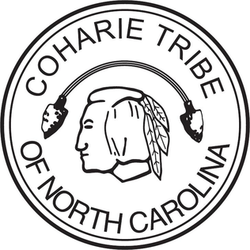The Coharie Intra-tribal Council, Inc. is a state-recognized tribe in North Carolina.[3] The headquarters are in Clinton, North Carolina.[5]
 Official seal of the Coharie Intra-tribal Council, Inc. | |
| Named after | Great Coharie Creek, Little Coharie Creek |
|---|---|
| Formation | 1911,[1] 1978[2] |
| Type | state-recognized tribe,[3] nonprofit organization[2] |
| EIN 56-1187928[2] | |
| Purpose | S30. Economic Development[2] |
| Location | |
Membership | 2,700[4] |
Official language | English |
Executive Director | Greg Jacobs[4] |
Revenue (2019) | $835,656[5] |
| Expenses (2019) | $743,463[5] |
| Website | coharietribe |
Formerly called | Croatan Indians of Samson County,[1] Coharie Tribe of North Carolina,[6] Coharie Indian People, Inc.[7] |
Formerly known as the Coharie Indian People, Inc.[7] and the Coharie Tribe of North Carolina, the group's 2,700 members primarily live in Sampson and Harnett counties.[4][6]
The group claims "descent from certain tribes of Indians originally inhabiting the coastal regions of North Carolina."[6] In 1910, residents of Herrings Township along the Coharie creeks identified as being of Croatan descent.[8]
Nonprofit organization edit
In 1978, Coharie Intra Tribal Inc. formed as 501(c)(3) nonprofit organization based in Clinton, North Carolina, and Freddie Carter serves as the organization's principal officer.[2] Its mission is to "provide housing, economic development, health, social services assistance and maintenance of the tribal roll for the members of the Coharie Tribe."[2] They have four employees.[5]
The organization operates a HUD/NAHASDA housing project with $557,380 in revenue and $550,186 in expenses for 20 unites.[2] Another program removed debris from the Coharie River after a hurricane, and another provided COVID-19 relief to members.[2]
Leadership positions, as of 2019, included:[5]
- Executive Director: Greg Jacobs
- Chairperson: Freddie Carter.
State recognition edit
In 1911, North Carolina first recognized the Croatan Indians of Samson County.[1]
The state of North Carolina formalized its recognition process for Native American tribes and created the North Carolina Commission of Indian Affairs (NCCIA) in 1971.[9] North Carolina formally recognized the Coharie Tribe of North Carolina as a state-recognized tribe on July 20, 1971.[6]
The current administration includes:[4]
- Chief: Ammie Gordon
- Executive Director: Greg Jacobs
- Tribal Enrollment Officer: JaNella Williams.
Petition for federal recognition edit
Romie G. Simmons sent a letter of intent to petition for federal recognition on behalf of the Coharie Intra-tribal Council, Inc., on March 13, 1981;[10] however, the organization never followed through with a petition for federal recognition as a Native American tribe.[11]
Activities edit
The Coharie Indian Cultural Pow Wow takes place in every September every year.[12]
E. Sequoyah Simermeyer, a member of the Coharie Intra-tribal Council and Navajo descendant, served as a Government Affairs Group Associate with the National Congress of American Indians and became a counsel to the assistant secretary in the US Department of the Interior Bureau of Indian Affairs in 2007.[13]
See also edit
- George Edwin Butler, author
- Dark Water Rising, a Coharie and Lumbee indie/blues band
Further reading edit
Notes edit
- ^ a b c Butler, George Edwin (1916). The Croatan Indians of Sampson County, North Carolina. Their Origin and Racial Status. Durham, NC: Seeman Printery. p. 31.
- ^ a b c d e f g h i "Coharie Intra Tribal Inc". GuideStar. Retrieved 26 August 2022.
- ^ a b "State Recognized Tribes". National Conference of State Legislatures. Archived from the original on 25 October 2022. Retrieved 26 January 2022.
- ^ a b c d "NC Tribal Communities". NC Department of Administration. Retrieved 26 August 2022.
- ^ a b c d e "Coharie Intra-Tribal Council". CauseIQ. Retrieved 26 August 2022.
- ^ a b c d "Chapter 71A. Indians". NC General Assembly. Retrieved 26 August 2022.
- ^ a b Cumulative List of Organizations Described in Section 170 (c) of the Internal Revenue Code of 1954. United States. Internal Revenue Service. 1980. p. 240.
- ^ Butler, George Edwin (1916). The Croatan Indians of Sampson County, North Carolina: Their Origin and Racial Status. Chapel Hill: University of North Carolina at Chapel Hill Library. ISBN 978-1-4696-4181-2.
- ^ "Commission of Indian Affairs". North Carolina Department of Administration. Retrieved 26 January 2022.
- ^ Federal Acknowledgment Process Reform Act. Washington, DC: US Congress Senate Committee on Indian Affairs. 2004. p. 156. ISBN 9780160733444.
- ^ "Coharie". Indian Affairs. US Department of the Interior. Retrieved 26 August 2022.
- ^ "Coharie Pow Wow Festival". Sampson County. Retrieved 26 August 2022.
- ^ "Artman Names E. Sequoyah Simermeyer as Counsel to the Assistant Secretary - Indian Affairs". Indian Affairs. US Department of the Interior. 11 September 2007. Retrieved 26 August 2022.